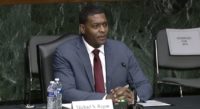President Bush's nominee to head the Occupational Safety and Health Administration, South Carolina labor lawyer Edwin G. Foulke, Jr., told a Senate committee that if confirmed he would continue the agency's outreach to employers and also have "strong, fair and effective enforcement." Republican lawmakers didn't indicate opposition to Foulke during the Jan.31 confirmation hearing, but the nominee faced tough questioning from the panel's top Democrat.
 |
| Foulke is former chairman of federal Occupational Safety Health Review Commission. (Photo courtesy of Republican National Lawyers Association) |
In his opening comments to the told the Senate Health, Education, Labor and Pensions Committee, Foulke spoke mostly in generalities, saying that if he's confirmed, "injury, illness and fatality prevention will continue to be the top priority of OSHA...."
Foulke, nominated to be assistant Labor secretary for occupational safety and health, said he would continue the agency's outreach and compliance assistance to employers, particularly small companies that may not have the resources to put in place major safety programs. But he also said that "strong, fair and effective enforcement will still play a visible and active role in OSHA's...game plan" if the Senate approves him for the job.
Committee Chairman Michael B. Enzi (R-Wyo.) noted that Foulke has extensive experience in workplace safety. That includes serving from 1990 to 1995 on the federal Occupational Safety and Health Review Commission, the first four years as the panel's chairman.
"Much progress has been made" in workplace safety, Enzi said, "but we can continue to do better." Asked by Enzi what his priorities at OSHA would be, Foulke said he would get safety information and "tools" to companies, especially small ones. He said that many small businesses don't belong to associations or large groups that could help them have more effective compliance programs.
The committee's senior Democrat, Edward M. Kennedy of Massachusetts, was more pointed in his comments. Kennedy said that while the workplace fatality rate has fallen 755 since OSHA was launched in 1974, the 2004 rate of U.S. workplace fatalities increased for the first time in 10 years.
OSHA says the 2004 fatality rate increased to 4.1 per 100,000 full-time employees, from 4.0 the year before. The number of workplace fatalities also rose 2% in 2004, to 5,703. But that total is down from 5,920 in 2000.
Kennedy also contended that the Bush administration hasn't issued any major workplace safety standards and that in agency enforcement actions, civil penalties have not been increased since 1990. "Every day workers are killed on the job and their employers walk away with a slap on the wrist."
In a statement on its web page, OSHA says its "enforcement efforts remain strong, fair, and effective, targeting the most hazardous workplaces and the employers who have the highest injury and illness rates." In fiscal 2005 total violations dipped 2%, to 85,307, though they were 10% higher than in 2001
Bush nominated Foulke for the top OSHA job last September, more than eight months after John Henshaw left the post.
Foulke is a partner in the Greenville, S.C., office of the law firm Jackson Lewis LLP. He has a bachelor's degree with honors from North Carolina State University, a J.D. degree from Loyola University School of Law in New Orleans and a master's degree in labor law from Georgetown University Law Center.
The Senate committee also quizzed Bush's nominee to head the Federal Mine Safety and Health Administration, Richard Stickler, who has been director of Pennsylvania's Bureau of Deep Mine Safety.

